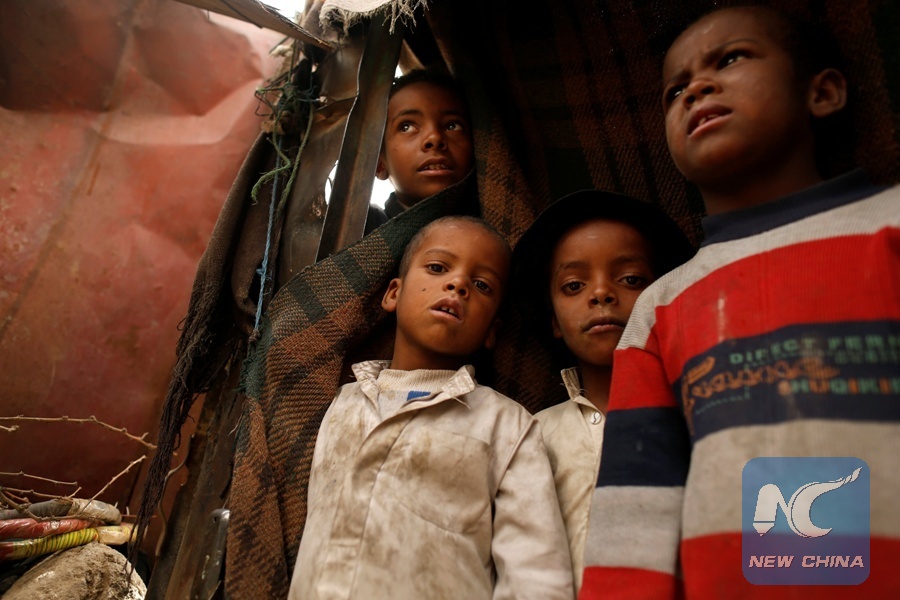
Children displaced from the Red Sea port city of Hodeidah stand at a shelter in Sanaa, Yemen July 18, 2018. (Xinhua/REUTERS)
UNITED NATIONS, Aug. 2 (Xinhua) -- A senior UN humanitarian official on Thursday highlighted the dire consequences of escalation in Yemen's Hudaydah on the Red Sea.
Conflict in Hudaydah governorate has escalated significantly and has displaced more than 340,000 people since June 1, John Ging, director of operations of the UN Office for the Coordination of humanitarian Affairs, told the Security Council.
Most of the displaced people are sheltering with host communities near their areas of origin, while smaller numbers have arrived in Sanaa, Aden and surrounding areas, he said.
Airstrikes by a Saudi-led military coalition around the entrance to one of the few functioning public hospitals in Hudaydah city and an adjacent fish market on Thursday have caused civilian casualties, he said.
Sustained hostilities in Hudaydah city, interruptions to the port operations or a siege of the city would be catastrophic and must be avoided, Ging warned.
There is no "contingency plan" that can effectively protect civilians from dire humanitarian consequences if conflict in Hudaydah escalates, as the capacity of international organizations and their response would quickly be overwhelmed, he said.
He noted that in Hudaydah city, one of the hardest-hit areas in last year's devastating cholera outbreak, infections are currently rising.
"It is essential therefore to bear this in mind when considering incidents like the one that is reported today, which affect a public hospital where humanitarian partners are treating cholera patients."
Last week, airstrikes hit water facilities in Hudaydah city and sanitation facilities south of the city. Water and sanitation lines have also been damaged in Hudaydah as forces in the city dig trenches, he said, adding that damage to health, water and sanitation infrastructure significantly increases the risks of the spread of cholera.
He said the Red Sea ports of Hudaydah and nearby Saleef, the lifeline for the majority of imports of essential commodities of food and fuel needed by millions of Yemenis every day to survive, remain open and operational.
In fact, he said, commercial food imports in May rose to their highest level since November 2016 and fully met requirements. However, food and fuel imports fell in June and again in July.
Despite continuous scaling up of humanitarian operations, serious obstacles persist, said Ging.
Inside Yemen, humanitarian personnel face numerous restrictions, particularly in areas controlled by Houthi rebels, he said. These include delays in movements, detention of staff and supplies, attempts to influence the selection of beneficiaries and the influence over the selection of partners.
All parties must respect international humanitarian law, including the obligation to protect civilians and civilian infrastructure, and to take all feasible precautions to avoid and minimize incidental harm, he said.
He called on all parties to work with UN special envoy for Yemen, Martin Griffiths, to find a lasting political settlement and sustainable peace.
Griffiths, who briefed the Security Council ahead of Ging, said he plans to invite the warring parties in Yemen to political consultations in Geneva on Sept. 6.
The consultations will provide the opportunity for the parties to discuss the framework for negotiations, to agree on relevant confidence-building measures and specific plans for moving the process forward, he said.
"Delays in reaching a political solution cost lives. The maths is as simple as that," he said.
Yemen has been in civil war in the past three years, pitting Houthi rebels against the forces loyal to the government of Abdrabbuh Mansur Hadi. The Saudi-led coalition, which is fighting Houthi rebels to reinstate the Hadi government, began a major offensive on June 13 to retake Hudaydah from the rebels.
As a result of war, more than 22 million people, or three-quarters of the population, need humanitarian assistance and protection. The conflict has left 2 million people displaced and 8.4 million people in the face of food insecurity. The country last year saw the worst cholera outbreak in the world with 1.1 million cases.

